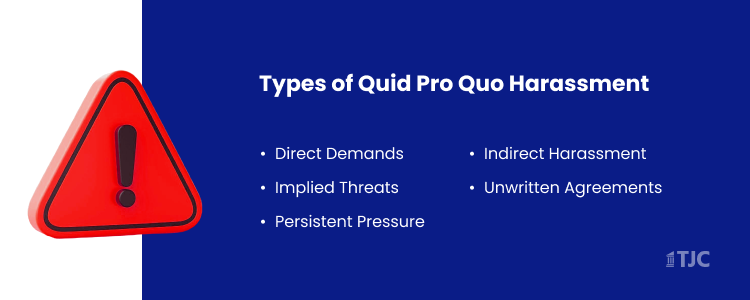Understanding quid pro quo sexual harassment is crucial for employees and employers alike, as it can lead to a hostile work environment. Rooted in the Latin phrase meaning “this for that,” this form of workplace discrimination involves an authority figure exploiting their position. They demand sexual favors in exchange for job benefits or to avoid adverse outcomes.
The negative effects of this behavior ripple through workplaces, creating toxic environments, undermining careers, and causing psychological harm. Federal and state laws prohibit these practices, but awareness remains key to prevention and accountability.
What is Quid Pro Quo Harassment?
Quid pro quo sexual harassment is a specific type of misconduct under the Civil Rights Act of 1964. It occurs when an authority figure makes unwelcome sexual advances, tying professional opportunities or threats of penalties to the victim’s response.
While this form of harassment primarily involves supervisors, it can also occur in other scenarios where one party holds power over another’s employment conditions.
Key characteristics:
- Requests for Sexual Favors: These can include explicit or implied sexual demands in exchange for employment benefits like promotions, raises, or desirable assignments.
- Threats for Non-Compliance: When a supervisor threatens negative repercussions — such as demotion or termination — for refusal to comply with inappropriate requests.
- Tangible Workplace Impact: The victim’s career or working conditions are directly affected by their response to the harassment.
Quid Pro Quo Harassment Common Scenarios
Understanding how quid pro quo sexual harassment manifests can help employees identify and report it. While no two situations are identical, the following are common scenarios:
- During Hiring Processes: A candidate may be offered a position contingent on meeting inappropriate requests, often from individuals with hiring authority. For example, an alleged harasser might suggest that rejecting their sexual advances could cost the candidate the job entirely.
- Performance Evaluations and Career Growth: Supervisors might tie raises, promotions, or performance reviews to compliance with their sexual demands. This places undue pressure on employees who fear negative consequences for refusal.
- Workplace Retaliation: Employees who reject inappropriate overtures might face punitive actions, such as reassignment to less desirable tasks, exclusion from important projects, or even unjustified termination.
- Everyday Interactions: Sometimes, harassment manifests in recurring requests or subtle but persistent pressures during day-to-day work interactions. Victims may find themselves cornered into compromising situations.
Quid Pro Quo Harassment Legal Basis
Federal and state laws provide a robust framework to combat quid pro quo sexual harassment, ensuring accountability and protection for victims.
Federal Protections
Under Title VII, it is illegal to engage in workplace discrimination based on sex, which includes harassment. The EEOC defines quid pro quo claims as those where employment decisions are contingent on submission to or rejection of sexual advances.
State-Level Protections
Many states extend the protections provided by federal law, often broadening the scope of what constitutes actionable harassment. For example, California’s laws make it easier for victims to establish an employer’s liability.
Employer Accountability
Companies can be held legally responsible if they fail to address harassment by employees in supervisory roles. This principle is especially relevant under the doctrine of “respondeat superior” where employers are liable for the actions of their agents if the victim experiences material harm.
Types of Quid Pro Quo Harassment
Quid pro quo sexual harassment manifests in various forms. While the explicit connection between workplace benefits and unwelcome sexual advances is a defining feature, the specific methods and circumstances can differ significantly. These include:
- Direct Demands: This is the most blatant form, where an authority figure explicitly requests sexual activity or favors.
- Implied Threats: Subtle but clear consequences are suggested if the employee refuses.
- Persistent Pressure: Harassment may occur over time, with repeated attempts to initiate unwanted sexual advances. Even after the victim refuses, the alleged harasser continues to press, creating a tense and uncomfortable environment.
- Indirect Harassment: Instead of directly demanding compliance, the harasser may use intermediaries or make the implications so obvious that the victim feels coerced.
- Unwritten Agreements: These involve situations where the victim reluctantly complies under perceived threat, creating a tacit understanding of exchange for professional benefits.
Differences Between Quid Pro Quo Harassment and Hostile Work Environment
Though quid pro quo sexual harassment and a hostile work environment both fall under the umbrella of sexual harassment, they differ in key aspects:
Nature of the Harassment
- Quid Pro Quo Harassment: This requires an exchange. Sexual demands are tied to tangible employment actions such as promotions, raises, or assignments.
- Hostile Work Environment: Involves pervasive, inappropriate behavior that creates an intimidating or offensive workplace, regardless of professional consequences.
Relationship of the Parties
- Quid Pro Quo: Generally involves individuals with power over the victim, such as managers or supervisors.
- Hostile Work Environment: This can arise from any employee, including peers if their behavior significantly affects workplace conditions.
Legal Threshold
- For a quid pro quo claim, the victim must demonstrate that the harassment resulted in a tangible workplace action.
- Hostile work environment claims focus on whether the behavior was severe or pervasive enough to impact the victim’s ability to work.
Recognizing Signs of Quid Pro Quo Harassment
Identifying quid pro quo harassment early is essential for mitigating its effects. Some signs to watch for include:
- Changes in Job Benefits or Conditions: Sudden shifts in promotions, assignments, or opportunities tied to sexual advances or refusals.
- Direct or Implied Requests: Remarks suggest that professional growth depends on attending personal meetings and dinners or engaging in inappropriate behavior.
- Behavior from Supervisors: A supervisor threatens demotion, pay cuts, or poor reviews after rejection of unwelcome sexual advances.
- Workplace Isolation: Exclusion from projects, meetings, or key decision-making after refusing sexual demands.
Impact of Quid Pro Quo Harassment on Victims
The consequences of pro quo sexual harassment extend far beyond the workplace. Victims often face a combination of emotional, professional, and legal repercussions, including
- Mental and Emotional Strain: Victims frequently report stress, anxiety, depression, and feelings of humiliation. The coercion involved often leaves lasting trauma.
- Career Stagnation: Refusing unwanted sexual advances can result in missed promotions, stalled projects, or even wrongful termination. Conversely, compliance may lead to feelings of guilt and self-blame.
- Workplace Isolation: Victims may experience ostracization from colleagues, reinforcing feelings of vulnerability and helplessness.
- Financial Loss: Lost wages, benefits, or employment opportunities often result from retaliatory actions, further compounding the impact.
Types of Lawsuits a Victim Can File
Victims can seek justice through:
- Federal Complaints: Filing with the EEOC, typically within 180 days of the incident.
- State-Level Claims: Extended timelines or additional damages may apply depending on jurisdiction.
- Civil Lawsuits: Potential recovery of damages for lost wages, emotional distress, or punitive action.
How Employers Can Prevent Quid Pro Quo Harassment
Employers can implement effective measures to reduce harassment risks:
- Clear Policies: Written anti-harassment policies, including a disciplinary action framework.
- Regular Training: Educating employees and managers about discrimination in the workplace and ethical conduct.
- Anonymous Reporting: Establishing secure and confidential channels for complaints.
- Prompt Action: Investigate allegations immediately and ensure appropriate responses.
Quid Pro Quo Harassment FAQs
Can Harassment Occur Without Explicit Requests?
Yes, harassment can happen even without direct or explicit demands. Implied threats or vague suggestions linking professional outcomes to compliance with sexual demands are also considered quid pro quo harassment. Victims should document such interactions promptly and report them to HR or legal authorities.
Are Coworkers Liable, or Only Supervisors?
Supervisors are usually responsible for quid pro quo harassment because they control job conditions. However, if their actions are severe, coworkers can create a hostile work environment. In either case, failure to prevent or address the harassment makes the employer legally responsible.
What Damages Can Victims Claim?
Victims may be entitled to compensation for lost wages, missed opportunities, and emotional distress caused by harassment. In cases of extreme misconduct, courts may also award punitive damages to deter future violations.
Even just one single incident can have a lasting impact. Consulting an employment lawyer ensures victims understand their legal rights and potential remedies.
How Long Do Victims Have to File a Claim?
Under federal law, victims typically have 180 days to file a complaint with the EEOC. State laws may provide longer deadlines, depending on the jurisdiction. Prompt action is essential to preserve evidence and strengthen the victim’s case.
Is My Job Protected During an Investigation?
Yes, retaliation against employees for filing a claim or participating in an investigation is prohibited under Title VII. Employers who penalize victims during this process may face additional legal consequences. Victims should report any retaliation immediately to the appropriate authorities or legal counsel.
Conclusion
Recognizing and addressing quid pro quo harassment is crucial for ensuring fair and respectful workplaces.
No one should feel pressured to accept inappropriate demands to secure their job or professional growth. Harassment comes in many forms, and employees have a right to be protected.
Victims are encouraged to report incidents, seek support, and consult legal experts to protect their rights. Taking action helps create a safer and more equitable environment for all employees.
Disclaimer: The information provided in this article is for informational purposes only and does not constitute legal advice. Readers should consult with a licensed attorney for legal guidance regarding their specific situation. The content is not intended to create, and receipt of it does not constitute an attorney-client relationship.






